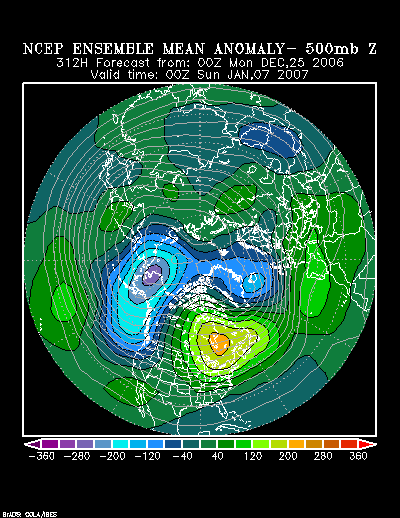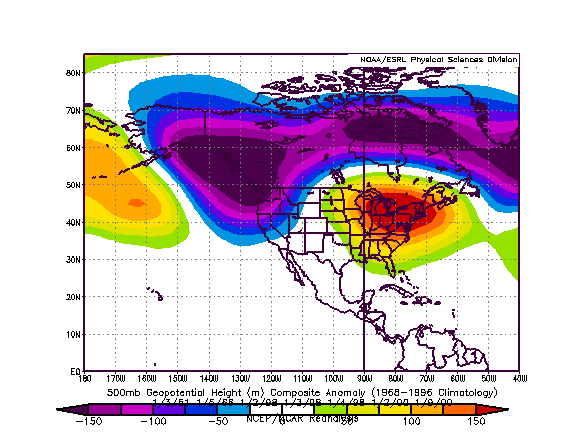The NCEP ensemble 500 mb anomalies forecast for 312 hours (1/7 0z) are:

That fits well with a number of historic warm periods that occurred in the January 1-15 timeframe since 1950:
North American Composite 500 mb height anomalies:

Northern Hemisphere Composte 500 mb height anomalies:

The NCEP ensemble 850 mb temperature anomalies forecast for 312 hours (1/7 0z) are:

During those periods for which the above height anomalies were present, the highest temperature reached in select cities was:
January 3-6, 1951:
Atlanta: 66°
Boston: 60°
Burlington: 50°
Chicago: 41°
Detroit: 51°
New York City: 61°
Philadelphia: 64°
Richmond: 70°
Washington, DC: 65°
January 1-5, 1966:
Atlanta: 68°
Boston: 61°
Burlington: 56°
Chicago: 49°
Detroit: 47°
New York City: 62°
Philadelphia: 60°
Richmond: 70°
Washington, DC: 68°
January 2-9, 1998:
Atlanta: 68°
Boston: 60°
Burlington: 47°
Chicago: 58°
Detroit: 56°
New York City: 65°
Philadelphia: 69°
Richmond: 71°
Washington, DC: 69°
January 1-4, 2000:
Atlanta: 73°
Boston: 64°
Burlington: 55°
Chicago: 60°
Detroit: 57°
New York City: 64°
Philadelphia: 67°
Richmond: 74°
Washington, DC: 71°
January 9-11, 2000:
Atlanta: 67°
Boston: 56°
Burlington: 44°
Chicago: 46°
Detroit: 49°
New York City: 58°
Philadelphia: 59°
Richmond: 64°
Washington, DC: 59°
At this time, that kind of warmth should be seen as offering some insight into the potential magnitude of the 1/5-12 warm period at its warmest: 50° or better in Chicago and Detroit, 60s or above in the Mid-Atlantic region (possibly a 70° reading in parts of the Mid-Atlantic e.g., at Richmond), possibly 60° or above as far north as Boston and 50° or above in Burlington.
 The posts in this forum are NOT official forecast and should not be used as such. They are just the opinion of the poster and may or may not be backed by sound meteorological data. They are NOT endorsed by any professional institution or
The posts in this forum are NOT official forecast and should not be used as such. They are just the opinion of the poster and may or may not be backed by sound meteorological data. They are NOT endorsed by any professional institution or 







